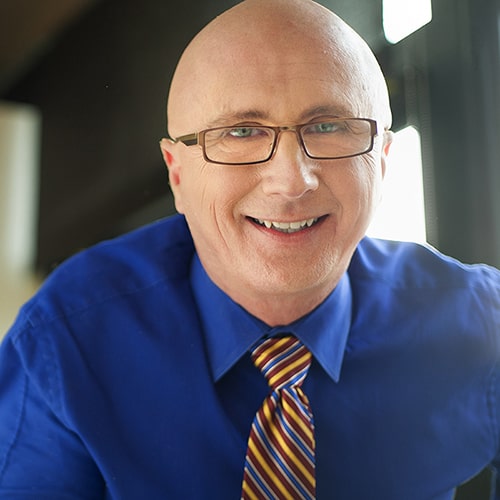It was early afternoon on a Wednesday in 2004. I was at the office talking with my wife on the phone about how her day was going, when seemingly for no reason, she said “Are you on your computer?”
“No, I’m not on my computer,” I replied.
“I can tell that you’re not really listening to me. I was telling you something important. Can we talk later?”
Apparently, this was not the first time it happened. Jan told me it had gone on for several years. Sometimes she could hear me on the computer. Most of the time I was missing half a beat of the conversation. Every time she asked me if I was on the computer, which I usually was, I always denied it.
Whether she was extra forceful in her frustration that day, I don’t know. I do know that for some reason it really clicked with me that time.
Honestly, it made me mad that she was right. Probably because I was finally fully aware of what I’d been doing. I was able to talk to virtually everyone on the phone and look at emails, sometimes even writing back — provided it didn’t require much thinking.
That’s the moment I realized that I had become a “Fake Listening Master.”
I always prided myself on being a good listener. But, as I got busier at work, I needed to get more done. I realized I could do small tasks during phone calls that seemingly didn’t interfere with the conversation. If I got too overly involved in my “side work,” I’d simply ask for the person to repeat what they said.
It worked really well. No one knew what I was doing because I kept enough attention on the conversation. At least that’s what I told myself. Until that fateful conversation with Jan.
In the post Comitted, Superhero Style, I talked about Jan’s Superhero name: Laser Listener. Her ability to listen so thoroughly has a healing effect on anyone she’s talking to. Apparently, it also gives her the power to sense when others aren’t listening to her.
As I sat back in my office chair, mulling the conversation with Jan, I thought about how I feel when someone truly listens to me. Whether it’s on the phone, driving down the road, or in person, I have a deep sense of connection and of being valued. I may not be able to tell when someone isn’t fully listening to me, but I sure can tell when I’ve felt fully listened to.
Have you gone to a restaurant where the food is excellent, but the service is not? The worse the service, the more it takes away from even the most masterfully prepared and presented dish.
If I prefer to go to restaurants where the food is well prepared and the service is spot on, why would my clients want anything less from me? They don’t. But they put up with it because it often feels like the norm with lawyers.
In September of this year, I spoke at an event called “Lawyers As Changemakers.” In preparing for my presentation, I spent a lot of time reading online reviews of lawyers from all over the country. Here’s what I learned:
Ninety-nine percent of the negative comments about lawyers had to do with their failure to communicate. Rarely did negative comments have to do with the legal advice.
I know what you’re thinking …“That’s not me.”
I know because that’s what I told myself until Laser Listener called me out on my well-intended, but nonetheless, delusional thinking.
Clearly, I had a decision to make: continue to mostly listen while getting other work done OR start the process of being a True Listener.
That’s when I started the journey of laser listening and witnessing the healing powers it has on my clients — as well as myself.
For example, once a week I talk with a potential client who already has an attorney. Most of the phone call is listening to them in order to understand what’s at the heart of why they’re contacting me. I have multiple goals for the conversation:
- To make sure I have enough time to fully listen to them.
- To understand the facts of their case.
- To understand where their case is in terms of what their lawyer should be doing.
- To understand their primary complaints and concerns.
- To give my frank opinion of what’s being done right and wrong.
- To give them a specific action plan to solve the problem with their attorney.
At the end of the conversation, I typically hear “Thank you for talking with me. You spent more time answering my questions than my attorney has in the last year.” And the benefit is in more than what their words tell me. I can hear it in their voice — calmness, understanding, and feeling respected.
These phone calls are more than lawyer to potential client interactions. These folks are looking to be treated fairly and to be valued like all of us are. When they’re helped that way, it’s a form of healing, and I get to be a part of that, which is one of the most rewarding parts of my work.
I’d like to tell you that it was an easy switch. But old habits, like the constant drive for efficiency to get more work done, don’t die easily. And, like anything you want to master — it not only takes years, you have to maintain your skills through constant practice. And, sometimes I’m a better listener than others, but I always do my best.
I don’t want to be one of those attorneys who knows the law well and gives good advice, only to spoil it with how I listen to my clients.
How about you?
The first step to turning things around is awareness.
Spend the next three weeks paying attention to how you listen to your clients. Are you looking at your emails, a letter on your desk, thinking of your next appointment, how fast you can get through the conversation? Or is it your goal to dig in and be a true listener?
My next post will look at the different ways to move from Master Fake Listener to True Listener and it’s healing effects.






Jim, great post! I just got an unsolicited text yesterday from a “friend of a friend” who says he has no idea what is lawyer is talking about and can I “interpret” what is happening in his case. He lives in another state and is therefore not a potential client. I’ll “triage” his case in the manner you describe above and coach him on how to talk to his lawyer. It made me feel sad that he would have to seek out a lawyer in another state to explain what his lawyer is doing.
However, I’m glad that the friend who referred him to me said “this lawyer will listen and help.”
I love your analogy of the restaurant. And I think people are often intimidated by lawyers and are scared to ask deep questions or say they don’t understand–even with their own lawyer! This person who contacted me apologized for typos that may have been in their text and I realize how seriously he takes talking to “the lawyer.”
Thank you for writing on these topics. And thank you for being a healer!
I get the “Fake Listener.” I have that in me as much as I have the therapeutic listener; the listener who hears the “story teller,” and not just the story. However, in this age of constant distraction, it’s not easy to take the time to listen (with awareness), to digest the story, dissect the problem, paraphrase the statement until agreement, to come to some resolution (hopefully) AND get to the million and a half things on my list in a given day. Add to that, the call from my spouse who has deeper needs but mundane questions…during break time. I appreciate your story about Jan. Have been there a way too many times myself.
I have to admit. My listening skills have dropped over the years, however, where i fall short, and where my best growth is, is in the simple statement: “i’m a little busy right now, can I call you back when I’m not as preoccupied?” Honestly, this is the hardest thing to do. At least for me. It’s my edge. Especially when I’m supposed to be “a good listener.” I mean, after all, isn’t that what family and customers expect of me?”
I look forward to hearing about some of your suggestions while l practice the simple task of being honest about my ability to listen in the moment. ha-ha. Thanks for the thoughtful article Jim.
Thank you for your comment David. I find that I can only be honest with my clients when I’m first honest with my self as to whether I can really listen. At times it seems easier to let my inattention slide to get the conversation done, but that doesn’t serving anything other than efficiency for simply getting the phone call done.